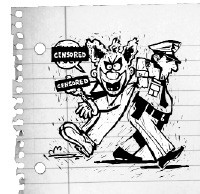For more than a year, I’ve driven out to Collierville at least once a week because of roller derby.
When people would ask me for directions to the bouts, I’d tell them to get on Bill Morris Parkway and drive until it ends. You’ll pass Winchester, the Mike Rose soccer complex, and the Avenue at Carriage Crossing shopping center, and when you see the orange barrels and can’t go any farther, that’s when you know you’re there.
But I can’t say that anymore. Last month, a new section of Bill Morris opened. The new stretch runs from Highway 72 to Piperton, cutting the drive considerably.
The project, part of Memphis’ new outer loop, cost taxpayers $36 million and brings Fayette County closer than ever before. But — no offense to Fayette County — is that really a good thing?
USA Today ran a story last week about more people being on the road earlier than ever before to beat morning rush hour. According to recent census figures, one worker out of every nine left for work before 6 a.m. in 2001; in 2006, it was one worker in every six.
The newspaper noted that the “commuter-creep” — partially a result of suburban sprawl — affects everything from “the breakfast-food industry to television viewership, from traffic-signal timing to newspaper delivery times,” as well as family relationships and personal health.
People are literally going to work too early and getting home too late to see their families. All because they’re trying to get to work on time.
I’m not against development. Whenever I hear people disparage suburbanites or say that they “hate the suburbs,” I find it ironically close-minded. Many of the city’s most beloved neighborhoods were once considered suburbs. The style of the houses may be different, but the basic idea is still the same: Give people a place where they have their own space but are not completely isolated.
There are also powerful incentives to living and building outside developed neighborhoods. Because of codes and zoning regulations, it’s often easier, not to mention cheaper, for developers to build on previously undeveloped land than to reuse land in the heart of the city.
Let’s say you want to build a new shopping center. You’ll want to attract a national retailer as a tenant, but they’re going to want a certain number of parking spaces for their customers and that can mean a lot of land.
Despite the reasons for sprawl, people are beginning to see the problems it causes. A Pew Center for Civic Journalism study found that Americans are beginning to think of sprawl as important an issue as crime, taxes, and education. Probably because sprawl affects all those things.
I recently heard one urban planner theorize that women, specifically suburban soccer moms, are “driving” a national movement back to the city limits. This is a group that spends large portions of their time in cars, shuttling children from one activity to the next, getting groceries, and doing errands. Who could blame them for wanting to consolidate their destinations?
Add in high gas prices and the inner loop of a city looks pretty good.
On a community level, sprawl has contributed to the financial problems of Shelby County, creating false growth through migration and coring once-vibrant areas.
The problem, however, is that sprawl is akin to gaining weight. Once it’s there, it’s difficult to get rid of it.
But there may be a way. On Thursday, the local Urban Land Institute and the UrbanArt Commission are presenting a free screening of Save Our Land, Save Our Towns, a film about the causes and effects of urban sprawl along with possible remedies.
Journalist and Pulitzer Prize winner Tom Hylton began his study of sprawl after the high school across from his house was closed and demolished because of declining enrollment. Visiting Pennsylvania, North Carolina, and Oregon, Hylton found that codes and zoning laws can have an enormous impact on sprawl.
Incentives and tax credits can also help. If building is easier and more inexpensive outside the city, something has to be done to make redeveloping land within the city limits more attractive.
But, for those who have the means, there’s one simple solution for both extra weight and urban sprawl: Just move.
 Greg Cravens
Greg Cravens